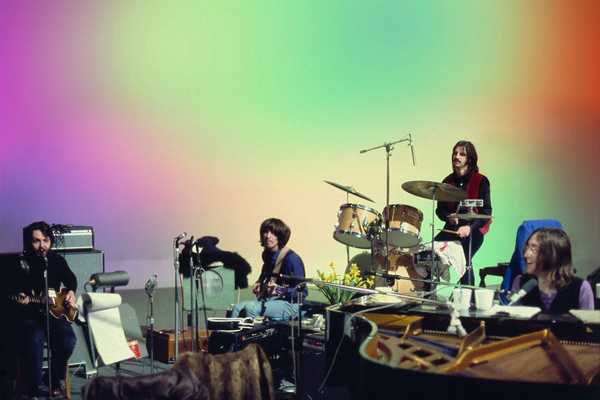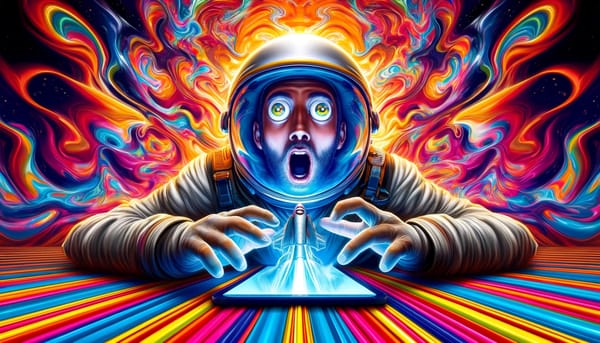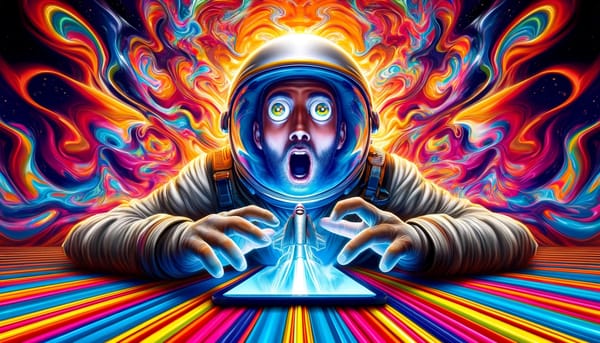They Stole Our Idea.

Here's Why That Matters Now.
Picture this: I'm sitting in a conference room as my team finishes pitching a campaign to an iconic fashion brand. Trust me, you’d know it - their logo is probably in your closet. I’ll wager $20 that it’s in there more than once if you’re married to a woman of a certain age.
The pitch kills. High fives all around. A few weeks later, we're fired. Six months later, I'm scrolling YouTube and there it is - our exact campaign–down to our exact talent choices–running nationally. No credit. No compensation. Just straight theft. I even saw an interview where the pompous Marketing Director who fired us spun the concept as their idea. Zero credit to those of us who actually developed the f–ing concept.
That was eight years ago. The wound healed, but the scar remains: a reminder that in creative work, your ideas are both valuable and vulnerable. Like a prize fighter entering the ring, you have to protect yourself at all times. But today's creative arena has gotten far more complex than a simple one-on-one bout.
The lines between inspiration and theft have never been blurrier. Take the recent lawsuit between Amazon influencers Sydney Gifford and Alyssa Sheil. Gifford claims Sheil copied everything from her video style to her home decor choices. Sheil argues the "clean girl aesthetic" belongs to no one. They're both right, and that's the problem.
Creative ownership used to be simpler. You made something, you owned it. Now? Your TikTok dance becomes someone else's viral moment. Your Instagram aesthetic becomes another's blueprint. Your AI-assisted artwork contains fragments of a thousand other artists' souls. The rules haven't kept pace with reality.
When I lost that campaign idea, I had two choices: spend precious time arguing into the social void, writing nasty emails and trolling those jerks, or I could move on. I chose the latter. Today's creators face even thornier choices. Take the "Blurred Lines" case - Robin Thicke and Pharrell Williams lost $5 million to Marvin Gaye's estate because their song felt too similar to "Got to Give It Up." Not because they sampled it. Not because they copied the melody. Because it felt similar according to a jury.
What makes ownership in a world of infinite reproduction? How do we define equity in a world of accelerated fragmentation? Three tensions define this space:
Legal vs. Ethical Rights
The law rarely matches morality. You might legally transform someone's work without credit, but that doesn't make it right. Just ask Taylor Swift, who's re-recording her entire catalog because while she created the songs, she doesn't own her original recordings. The synergy between law, ethics and morals splintered long ago in our society (sadly).
Inspiration vs. Theft
We all build on what came before. The Beatles drew from Chuck Berry. Picasso was influenced by African art. But there's a line between standing on the shoulders of giants and stealing their shoes. That line gets thinner every day. Or in the case of the thieves who took our award-winning campaign and passed it off as their own. (I’m not bitter, I swear… OK, I’m still 10% bitter. Sue me. 🤷🏼♂️)
Credit vs. Control
Sometimes you can't own the idea, but you deserve recognition. In today's attention economy, credit is currency. When that retail brand stole our campaign, they didn't just take our idea. They took our moment. Our pride. Our proof that we could punch above our weight.
AI adds rocket fuel to this fire. It can generate art in any style, write in any voice, compose in any genre. It's both the ultimate copying machine and potentially our best tool for proving originality. Imagine if I'd had a blockchain record of our campaign pitch, timestamped and immutable. Or an AI system that could track the DNA of our creative work across platforms. Imagine how good the idea may had been if I’d used AI to help generate the brief and concept work.
The best creators aren't just fighting theft - they're redefining ownership. Take the artist Beeple, who sold an NFT of his work for $69 million, creating an unbreakable digital signature of authenticity. Or consider how AI image generators are now developing "opt-out" systems for artists who don't want their work used in training data.
But technology alone won't solve this. The real protection comes through propagation. Make so much good work that your voice becomes unmistakable. Use the tools available - AI, blockchain, legal frameworks - but don't let them consume you. Your best defense is the same thing it's always been: the ability to create something new tomorrow. AI can help. It isn’t the silver bullet.
The thieves will always come. Fight them when they try to take your work. NEVER let them diminish your creative spirit. That belongs to you alone.
⚡️🎨⚡️




